Key takeaways:
- Independent publishing empowers writers to connect directly with their audience, offering creative control and authenticity.
- Writing coaching nurtures potential by providing structure, encouragement, and accountability, helping writers navigate self-doubt.
- Effective writing coaches require strong language skills, communication, and empathy to build trust and support writers’ journeys.
- Building a coaching practice involves strategic outreach, personal connection, and ongoing learning from peers and clients.
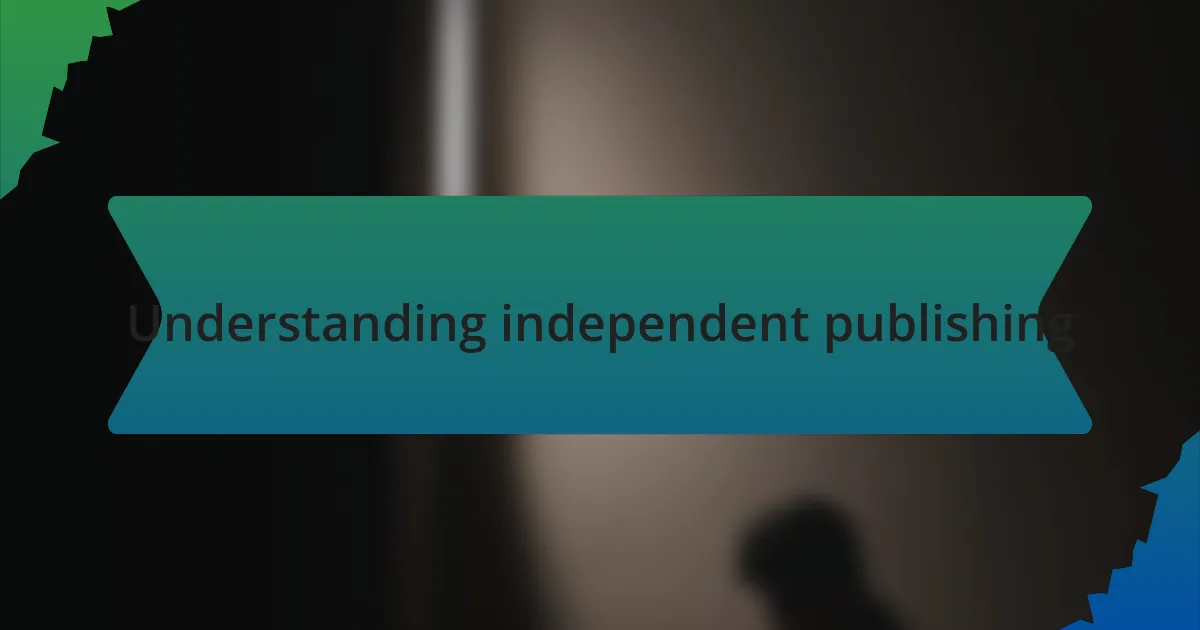
Understanding independent publishing
Independent publishing is an empowering avenue for writers seeking creative control over their work. I remember the exhilaration I felt when I first decided to publish my writing independently; it was as if I held the keys to my own kingdom. The process allowed me to express my voice authentically, free from the constraints of traditional publishing gatekeepers.
One of the most compelling aspects of independent publishing is the ability to connect directly with your audience. Have you ever noticed how much more personal a message feels when it comes straight from the source? I learned this firsthand. When I self-published my first book, the emails I received from readers felt like building relationships. They appreciated my raw, genuine approach—a testament to the strength of this model.
However, navigating the world of independent publishing can sometimes feel overwhelming. I often found myself pondering: Where do I even begin? The beauty of this journey is that there are countless resources available, allowing you to find your own path. Embracing the challenges of independent publishing transformed my fears into newfound strengths, empowering me to become both a writer and a coach for others on a similar journey.
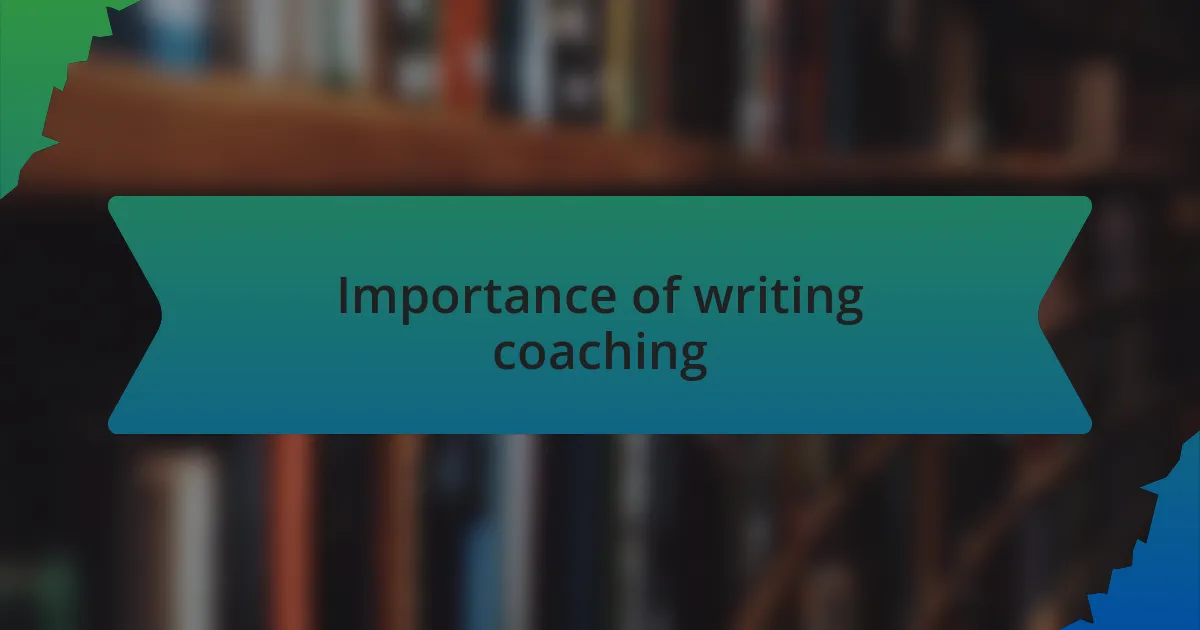
Importance of writing coaching
Writing coaching plays a crucial role in nurturing a writer’s potential. I recall a time when I struggled with self-doubt, wondering if my writing was good enough. Having a coach to help navigate those uncertainties made all the difference; they provided structure, encouragement, and a fresh perspective that I desperately needed.
Through my experiences, I realized that writing coaching offers more than just skill development. It serves as a support system during the often-isolating journey of writing. When I coached my first student, I felt an exhilarating urge to ignite their passion and impart lessons I had learned the hard way—like the importance of vulnerability in writing. Can you imagine the impact of having someone in your corner, cheering you on as you share your unique voice?
Moreover, a writing coach helps writers set and achieve goals while holding them accountable. I remember when I established a regular writing schedule for myself. Having someone to report my progress to not only kept me on track but also fueled my commitment. Isn’t it fascinating how a little accountability can turn dreams into achievable milestones? Writing coaching embodies that transformative power, guiding writers toward their aspirations with confidence and clarity.

Skills required for writing coaches
To be an effective writing coach, a strong grasp of language and composition is essential. I often find that understanding the nuances of grammar and style, along with the ability to analyze texts critically, allows me to provide tailored guidance to my clients. Have you ever wondered how a single misplaced comma could change the meaning of a sentence? It’s those small intricacies that can elevate a writer’s work significantly.
Another crucial skill lies in communication. A good coach must be able to articulate feedback constructively, balancing honesty with encouragement. I recall an instance when I had to deliver tough criticism to a student struggling with plot structure. I made sure to highlight their strengths first, creating a safe space for them to absorb the more challenging aspects. This approach reshaped not only their writing but also our professional relationship—it transformed into a partnership rooted in trust.
Empathy is equally significant in this role. Connecting with writers on an emotional level helps in understanding their unique challenges and aspirations. I remember coaching a novice who was paralyzed by fear of judgment. By sharing my own battles with vulnerability, I was able to help them, gradually revealing their authentic voice. Isn’t it remarkable how a coach’s empathy can turn fear into confidence?
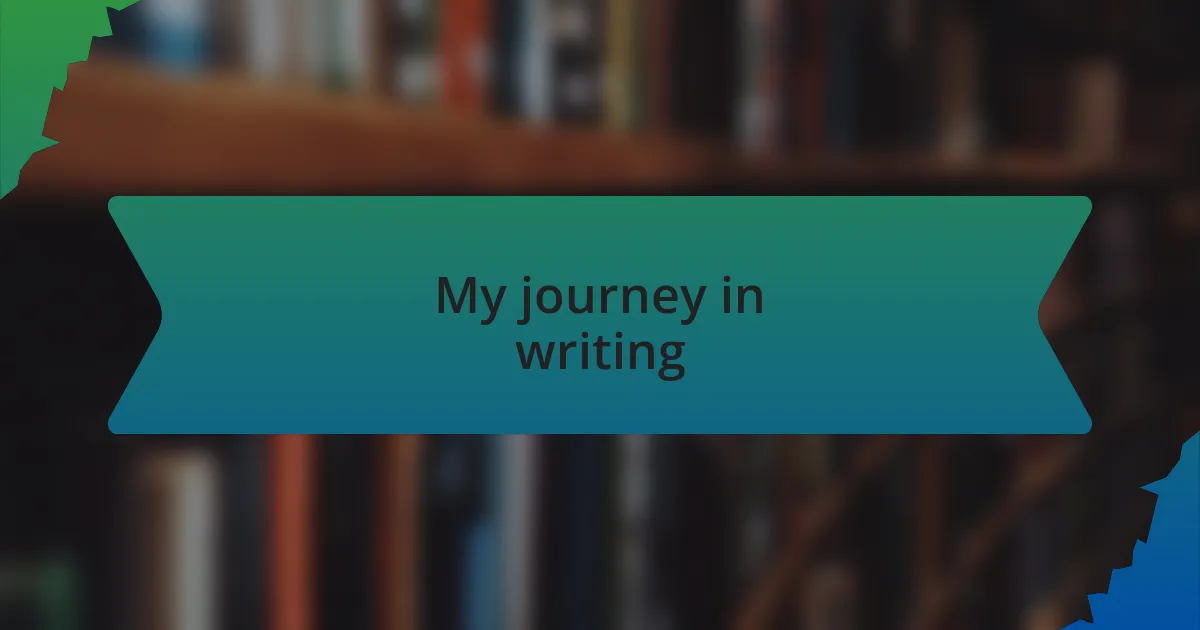
My journey in writing
I embarked on my writing journey as a young child, scribbling stories in the margins of my notebooks during class. Those early experiences were a delightful mix of imagination and experimentation. Can you remember the feeling of crafting your first complete story? For me, it was exhilarating, lighting a spark that would guide my path for years to come.
As I matured, so did my writing. High school essays pushed me to refine my skills and explore various genres—poetry, fiction, and even nonfiction. I vividly recall a creative writing workshop where I shared a particularly personal piece. The feedback I received was overwhelming and reinforced the idea that vulnerability can be a powerful tool. It made me realize that writing is as much about sharing our experiences as it is about crafting perfect sentences.
My college years further solidified my passion for writing. I joined literary journals and took on editorial roles, shaping not only my voice but also my ability to collaborate with others. One moment that stands out for me was when we published a collection of student stories that resonated deeply with the community. I felt a rush of pride knowing that our collective efforts gave a platform to voices that needed to be heard. How often do we underestimate the impact of our words on others? This realization was a turning point for me, steering me toward becoming a writing coach, eager to empower others on their own journeys.
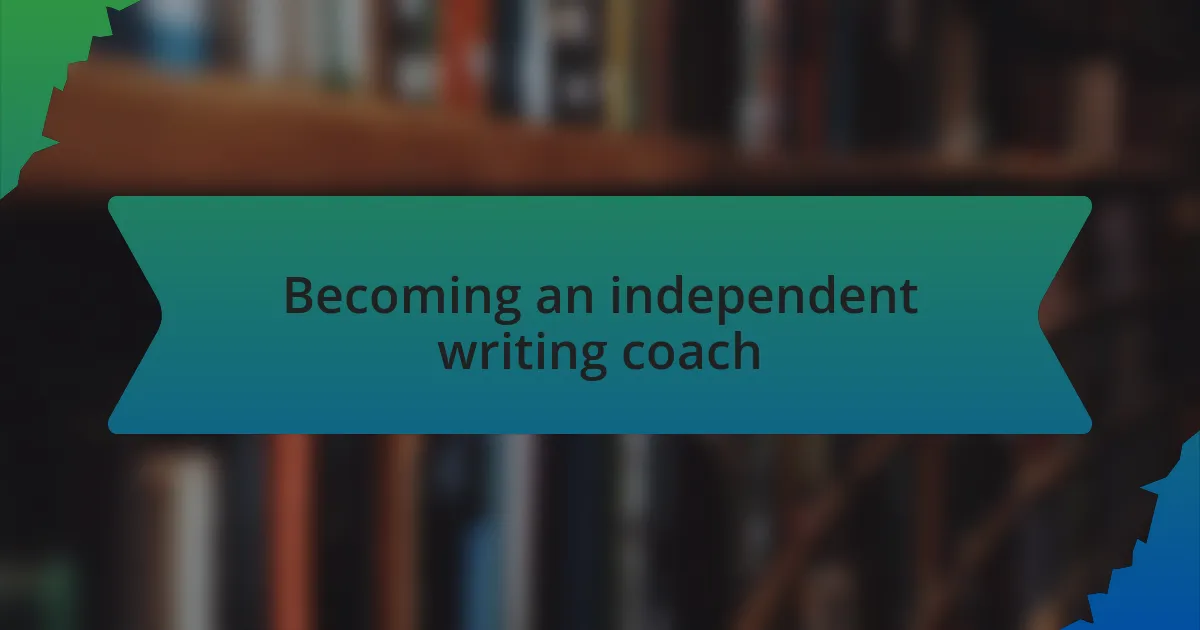
Becoming an independent writing coach
Becoming an independent writing coach has been an incredibly rewarding experience for me. After years of honing my craft, I felt an undeniable urge to share my knowledge with others. I remember one particular instance when a student I mentored shared their manuscript with me. As I read their heartfelt prose, I was overwhelmed with joy, realizing that my guidance had an impact on someone else’s journey. Isn’t it amazing to think how our own experiences can help illuminate another’s path?
One key step in this journey was building my brand as a coach. I spent countless hours developing a website, crafting content that reflects my philosophy on writing. It felt like putting a piece of my soul online, and it was exhilarating. I’ve found that authenticity resonates deeply; when potential clients see my genuine passion for writing, it helps establish trust. Have you ever wondered how much of yourself you should share with others? Trust me, vulnerability can be your greatest asset.
Additionally, I invest time in ongoing learning and networking, connecting with fellow writing coaches and aspiring writers alike. Each interaction has enriched my perspective and allowed me to refine my coaching techniques. I recall a workshop where I met a fellow coach whose methods inspired me to try new approaches. It’s essential to remain open to growth in this field; after all, isn’t evolution a pivotal part of being a great coach?
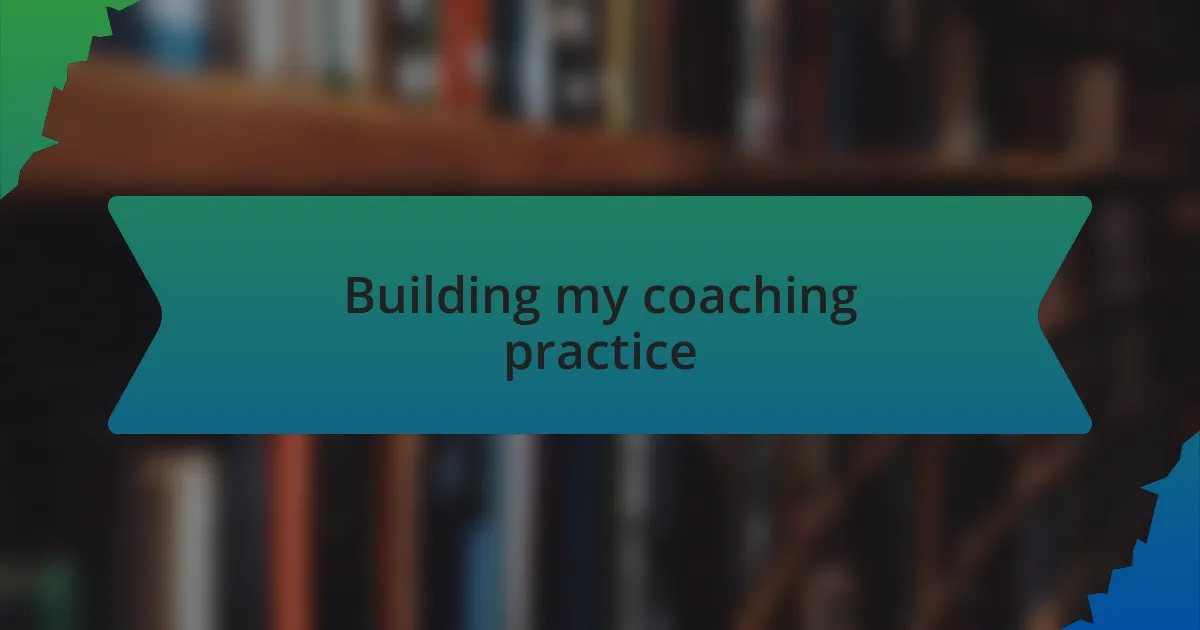
Building my coaching practice
Building my coaching practice involved a blend of strategic outreach and personal connection. I reached out to local writing groups, offering free workshops to showcase my coaching style. One memorable evening, I spoke to a small group eager to polish their narratives. As I watched their eyes light up with newfound understanding, I felt a profound connection; it reinforced my belief that coaching is as much about listening as it is about teaching.
Social media has also played a pivotal role in expanding my reach. I remember posting an inspirational quote about storytelling, which unexpectedly sparked a conversation among my followers. Engaging with aspiring writers online helped to solidify my community and has led to several clients who resonate with my approach. Have you ever felt a spark of inspiration from a simple post? That’s the kind of magic I strive to create every day.
As my practice grows, I make it a point to ask for feedback from my clients. Recently, one of them shared how our sessions helped them overcome their writer’s block, which made my heart swell with pride. It’s these moments that remind me why I chose this path. Isn’t it fulfilling to see your impact reflected in someone else’s success? Building my coaching practice is not just about the numbers; it’s about creating lasting change in the writing journeys of others.
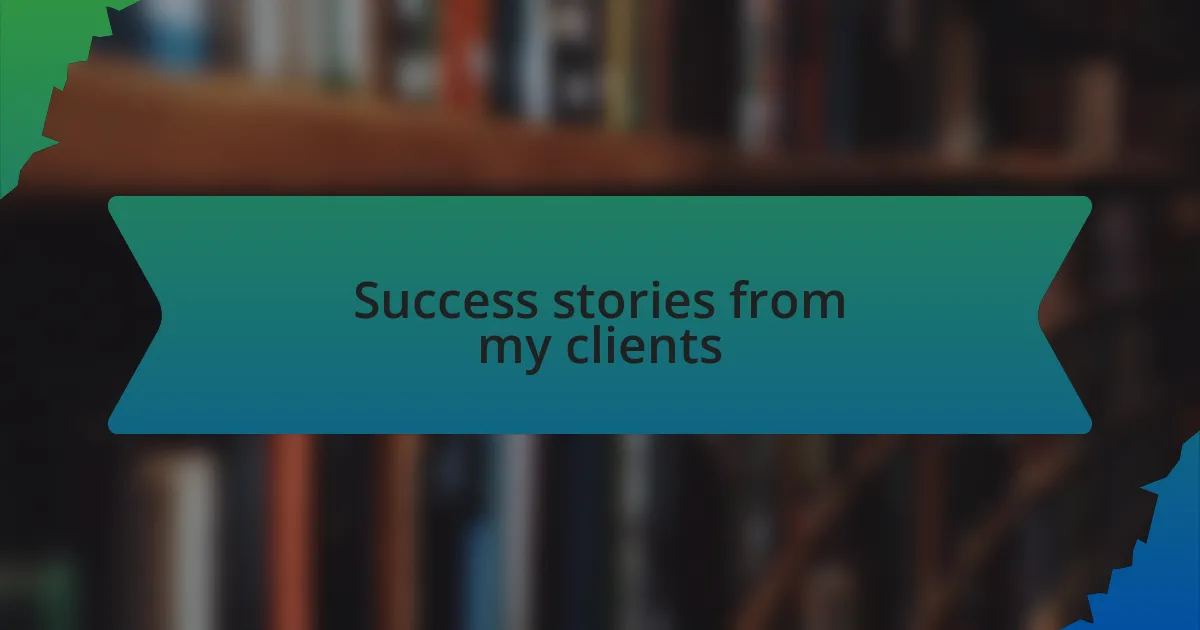
Success stories from my clients
I’ve had the privilege of working with a client who had always dreamed of writing a memoir. Initially, she felt overwhelmed and uncertain about sharing her story, fearing judgment. After several sessions focused on building her confidence and establishing a clear outline, she finally finished her first draft. The moment she called me, her voice trembling with excitement, was unforgettable. How amazing is it to witness someone transform their fear into a published narrative?
Another success story comes from a young writer who longed to write a fantasy novel but struggled with world-building. Through our coaching, we explored elements of her favorite books, dissecting what made them captivating. It was heartwarming to see her draft come together, filled with vibrant characters and complex plots. When she shared the initial positive feedback from beta readers, I couldn’t help but feel a surge of joy. Isn’t it incredible how collaboration can unlock hidden potential?
Then there’s a client who initially joined me to improve their writing skills, but soon discovered their passion for editing. Together, we honed their eye for detail and narrative structure. They’ve now launched a freelance editing business, helping other authors fine-tune their manuscripts. Hearing about their journey and the joy they find in supporting fellow writers is a testament to the ripple effect of coaching. How rewarding is it to see someone not just write, but find their true calling?